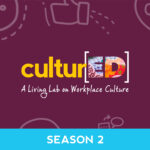
Melissa sits down with esteemed Executive Chef and owner Charlie Foster to discuss how strong culture at his restaurants drives low employee turnover.
Melissa: Welcome to the cultur(ED) podcast. I’m Melissa Jezior, your host, on this podcast, I talk to top culture makers in the world today, to unpack the visible and not so visible forces that make up this often-overlooked superpower. Season two of cultur(ED) is focused on changemakers from the restaurant industry. With me today is Charlie Foster, Executive Chef, and owner of three restaurants in the Greater Boston area. Woods Hill Table, Pier 4, and Adelita. Welcome Charlie, and thanks for joining us.
Charlie: Thank you for having me. Happy to be here.
Melissa: So you and your partner and Kristin Canty have three restaurants Woods Hill Table, Pier 4, and Adelita. Each is unique in its own right. How would you describe the culture at each restaurant?? Are they similar, are they vastly different, or something in between?
0:45
Charlie: Well, I would say there’s, there’s obviously differences based on the personnel between the two restaurants, but the, there’s a couple shared ideals, that I think attract all of the employees that we have that bind the cultures together. Which obviously is really important as a growing organization to have some continuity between the businesses. And that’s expressed by our low staff turnover. We’ve had employees that have worked for the company since day one that are still there, which is really uncommon in the restaurant world. It’s a very demanding profession, especially when you’re in a more fine dining atmosphere. There’s a lot of pressure, there’s a lot of stress, and it can be, as we’re seeing around the country, around the world, the restaurant industry is one that needs some work on the way that it treats staff and the way that people in positions of power behave. And so, the fact that we have such a low turnover, is indicative of the fact that people are feeling positively about the workplace.
So, we have that at all three of the restaurants. And I think another binding factor is people take pride in what they’re serving at a restaurant, because I think, you know, our restaurant group was founded on, you know, by Kristin on very much an idealism. It was to make an impact in the community to support local economies through purchasing power and to serve people healthy food and educate them on why that food is healthy. And that is something that’s very central to the people that have stayed with us, for any length of time.
And the pride stems from the fact that we’re trying to do is, is make an impact, make a difference. We’re not just trying to get in there and make some money, get out, or just make a paycheck or even just trying to be, as a lot chefs in a fine dining atmosphere. Try to do is just be the best, absolute, you know, the best possible restaurant and serve the most innovative or esoteric foods. Obviously, I had ambitions for that, you know, of course. But, it’s about utilizing the products coming from farms and about sitting down with farmers in the winter and talking about what crops they’re going to plant. And then how am I going to use them? And then guaranteeing that I’m going to purchase those crops.
2:50
And listening to what they need as far as how we order from them and not just being a dictator thing and I’ll bring you this now and otherwise I’ll go to somebody else. It’s about having a very, very much to our relationship with our purveyors, with our staff, with the ownership, with the farm. It’s all it’s all give and take.
And I’d say that pride that people take in having more depth and more of a story to tell about why the restaurants exist and why the food and beverage is being served. I think really attracts people and makes them want to stay.
Melissa: So you talked about these ideals that your restaurant holds and the fact that you think these ideals contribute to low turnover. How did those ideals factor into recruiting when you’re looking for new hires? Do you, is it are there specific questions you ask to get to where people’s heads are around your ideals or whether or not they’d be a good fit for working in your environment?
Charlie: Yes, I try and we try when we place ads to talk a lot about the merits of the restaurant and why it exists in the first place. And that there is—it’s not just, Hey, you know, X restaurant looking for this, we’ll pay this much. We try very hard to express to the staff why we exist.
And that is a draw for some employees, but I have to be honest recruiting staff in Concord, Massachusetts is the most challenging part of the entire business by far, no question. Nothing else even comes close to just trying to have staff in the restaurant has been so unbelievably hard to keep the restaurant and to attract people that actually have the desire and the potential to learn and be consistent, and be a part of where we want it to be. Because obviously, restaurants continually evolving and restaurants are dependent on its oldest parts, you know. And that’s constantly changing.
4:34
And so low turnover is good. But having the right people in the right places, everything, as in any business. And that’s been really, really hard to achieve. So, yes, we try to use everything we can to say, hey, we’re different, we’re better, you know, be a part of something bigger than yourself, and come work with this restaurant because of all the things that we’re trying to do for regenerative farming and soil health and having an impact, and supporting local farmers. And, I mean, that all that really is near and dear to our heart. It’s not just a gimmick, but it hasn’t made recruiting easy.
Melissa: I believe it. I think, I believe that, you know, a lot of organizations right now, a lot of businesses right now, talk a lot about purpose driven culture. And it sounds like, essentially, that’s what you all have been working to achieve this purpose driven culture. How has that changed and shifted over the six years you all have been in business? Or has it?
Charlie: Well, you know, it definitely has. I mean, you go from 30 employees on the open, overall to before COVID, we had something like 135 employees in your restaurants. I mean, that’s just a very different scale of operations.
So, one thing I mentioned earlier was that I was, I was 29.
5:48
And now I’m 35, so young, but a lot of change in the six years, so I’d say opening the initial restaurant, and only having, you know, we’re open for six days a week. I was there for every minute of every day, first person in last person out. I saw everything that took place in that restaurant, I touched every plate of food and did a lot of the dressing myself. And that was indicative of a different level of accountability for the other people, like my ability to share and hold people accountable. And, you know, demand certain performance from people was very different than, because all I was concerned about in the beginning was, you know, how do I use these farm products, and how do I serve the absolute most badass food that can and make a name, right? I mean, that’s what, that’s what I was trying to do. I wanted to be a part of this organization, because it had a purpose to it, and I wanted to show that I could do it and do it in the highest possible level.
6:40
And pull that off in West Concord, Massachusetts, which is an additional challenge unto itself, so that, you know, over time, change very much because you start to see, hey, you know, some of the stuff that we’re doing here is financially irresponsible, or even reckless. Like, there are some things that we need to really change here in order to become a sustainable operation, not just in environmental sustainability, but in financial stability, the balance between those two things I think it’s been such a huge opportunity for learning and growth for me, and for the other people that were partaking in this experiment. Because as I’ve said, to people in the restaurant a lot when you try to do everything right, when you try to teach your staff right. Treat your staff well, through compensation and respect and paid time off. And then you try to treat the animals well and you try to treat the local farmers well, and you try to guess, well, everything, right, where’s the where’s the money? Or the profitability?
But if you don’t have a viable business model, what point are you proving, right? Are you making a statement that, hey, you can’t run a business in this way? You’re not really that. We really can you, because you just lost you just lost money. There’s no, there’s no finite. I’m looking at your P&L and yeah, right, I’m not going to run a business like that and so that’s been our constant challenges. We’re evolving to balance ourselves and it’s a very, very difficult.
And I thought I’d say the evolution has been from trying to find that—identify the balance between idealism and reality, and put ourselves in a position where we can actually sustain ourselves, play the long game.
8:07
Melissa: How much do you bring your staff into that balance that needs to be struck? In other words, are you constantly educating your staff on what it, what it’s like to run a business and how you have to balance that with the employee experience and culture? So, I’m curious how much you bring your employees into that problem solving mode, or to that discussion?
Charlie: Yeah, well, a lot. I mean, especially with management, we’ve always been really transparent with the financial health, or lack thereof, at different times in the restaurant’s life. And that is a good tool for people that, for some and for others, it’s frustrating. And a reason why they don’t want to be there, because it’s been a very difficult road trying to open a farm support the farm, opened a restaurant, modified a business parameter to that restaurant. You know, remove the labor supply in the kitchen so you, cut your pastry program. You know, we shifted our raw bar, we played with business hours of operation, price point. Everything. Right? How we were breaking down animals which way they were being fabricated by the slaughterhouse and then coming to us. I mean, there’s so many different variables, especially when you’re responsible for essentially inventory and wholesaling your own farm raised products back to yourself.
Melissa: Well, let’s talk about the farm here for a second. is how much does the staff at the farm interact with the staff at the restaurant and are there cross-pollination of ideas?
9:35
Charlie: So, every year except for this year because of coronavirus, we would have a massive outing to the farm where we go up and visit the farm for three days and kind of just party because there’s so much stress in our, in a restaurant environment. Being able to take couple of days off and just hang out with the team and not be responsible for, you know, being on stage for that service, you know the stress and move into that.
That was a great opportunity for team building, you know, for the restaurant, and for the restaurant when it was, was filling out Abelita. We haven’t had a chance to do it with Pier 4, because it opened up in November and then, you know, all this stuff happened. But that was awesome because it legitimized what we were telling people when they came and went, and saw the farm, and they met the farmers, and they thought the animal understood a little more about the operation, and how, how much work goes into it, and how hard it is to constantly rotationally graze 100 cows at once.
10:29
And how you have to start planning two years ahead of time, if you want to change your parts on beef and, you know, a year ahead of time for pork, because there’s just so much logistics that go into it. And I think it helps people understand why what we’re doing is special and unique, and why we’re fighting. As hard as we are, and if we’re being demanding, if we’re holding people accountable, maybe more than they would be another job. There’s a reason for it.
Melissa: I could definitely see that probably help bring them—bring the vision to life, On your three day retreat, is it all fun, or is there any business component to?
Charlie: That’s mostly just fun.
Melissa: That’s good. I’m sure that’s good with culture building as well.
Charlie: Yeah.
Melissa: So, restaurants historically have been known as difficult environments for employees. We talked about that a little bit a while ago. High stress long hours, physically demanding burnout. Tell us about your vision for the employee’s work environment.
Charlie: Sure. So I’d say that that’s a lesson that I’m still learning and one that I progressed a lot on through the growth through being a part of the growth of the restaurant from one restaurant to three. In the beginning, I definitely put everything on my own shoulders. I wanted to touch like I said, every plate of food, I’m wanted to do all the prep myself by. You know, I would get up in the hoods and clean them, I would get down on my belly and hose the floor and clean out floor drains. No matter what I would just do it.
11:50
That view, that first one in, last one out, that self-sacrifice. You know, I’ll–you know, I’m going to be home late and not my family this week, and work the six days not ask other people to do it. That setting of an example in in hindsight, wasn’t the best way to do it. I have to say, I still believe in that I still pride myself on working hard and still covering stations, and being able to do, you know, what I’m asking the people to do better than they can at least, or at least, as well as they can. It’s very important to me to have that energy and be on my feet. And I never, I actually, in designing, I’ve had a hand in designing the restaurants and the–when we took over our lease lease, I ripped the office out, and I refused to put an office in there because I just don’t want them there. I don’t want managers sitting in an office separating themselves from the staff. You need to code invoices, or get some work done, set up a laptop, it’s 2020, you know, set up a laptop stand and be with your staff and get your work done. So I still believe in every very strongly. The ability to hold people accountable by demanding as much as you need to, from them and identifying, like, what areas of responsibility are, and clearly defining those things, and then communicating about what’s being done and what’s not, is so important to loyalty, to staff retention and morale. Because people, you know, if you, if you just do everything, then naturally, the people around you will allow you to do so. And that’s not necessarily educational me that he would think it would be, as a young chef trying to set the example. And I’m sure that applies to other industries. And so now, naturally, having multiple restaurants, having to rely on people, not being there for service, and not being able to see everything and taste everything, and touch everything. You know, you have to just have really good communication, and, therefore, trust. And that’s been sort of how I’ve been trying to phase my management style. And the culture the restaurant’s into, one where we are very, very good, or at least getting better every time at constant communication and clear delineation of responsibilities and accountability.
13:50
Melissa: Did you have an ‘aha’ moment where you realized that you needed to do this and not just do everything yourself? I’m curious how you, how you came to how that evolution happened.
Charlie: So I have, I’ve been married for, I recently celebrated my 10 year wedding anniversary.
Melissa: Congratulations
Charlie: My daughter’s in Sixth grade. She just turned 11. You know, as a young chef, I came, I came from the old school environment. I worked for nothing. And I pulled 80, 90, 100 hour weeks for years and, you know, made no money for it, but it was very much an apprenticeship. And that is just not how the industry is at all anymore. Like, not whatsoever, I did shift pay. You’d make $100 a day and work 16 hours. I did, you know, you just don’t get any OT and you’re working a billion hours, and I know that the chef’s screaming at you.
And that’s where I came from. And I’m glad that I did, Because I know what that’s like, and I also learned a lot from it, and the craft and the depth of my knowledge about how to operate in the kitchen.
14:50
Melissa: So let’s talk a little bit about the COVID pandemic. You just opened Woods Hill Pier 4 and then the pandemic hit. So, I can’t imagine a worse time, given how capital intensive it must be to open a restaurant. And now I hear you are back open for dinner and take out. So tell us a little bit about with so many restaurants going out of business with this pandemic how did you get to be so resilient?
Charlie: Well, for one, we’re used to playing the long game in this business. I mean, we opened up Wood’s Hill six years ago, and it was all about, you know, we opened up Wood’s Hill we had, like 40,000 pounds of meat from the farm that we had to start going through. And so we opened up Adelita to help us with that two years later. And then we opened up Wood’s Hill Pier 4. And it’s all been about, how do we continue this growth slowly, I mean, we opened up the restaurants, but we try to be realistic about what our goals are for each restaurant, and always trying to stay true to our vision. And so, because of that, I think we’re used to pivoting. We’re used to looking at what our operation and changing the way that we do things and trying to be creative. And we’re also solving a lot of non-traditional problems in the restaurant, like I mentioned before the logistics of getting the meat from the farm, the slaughter house and how to devise a menu where every item between all the restaurants is about, while we have these things, you know, we have pork jaws from the farm. We have a thousand pounds of them; what are we going to do?
So that, sort of, intrigued me so much about this job, which was, know, I’m going to have to do more and be more involved than I would probably would anywhere else.
16:20
I think is sort of set us up to look at things and say, OK, well, we can figure this out. We solve a lot of other really, really weird, difficult problems. Here’s another one, what are we going to do, or we need to be creative about this. How are we going to shift their operation? How are we going to pivot, how are we going to be flexible? And I just say they we’re kind of used to that. We were used, and no one has been through this, everyone keeps saying it’s unprecedented. It is, but I’d say that our operation in itself is kind of unprecedented in all the, all the crazy stuff we’ve been through to try to get them here.
Melissa: So you talked earlier about being in Concord, Massachusetts being one of the hardest parts in terms of hiring the right people, finding the right people, for your restaurants. How have you, when you find people who aren’t the right cultural fit, how do you figure that out, and what do you, what do you do about it?
17:07
Charlie: Well, another lesson that’s been a difficult one to learn is when to, even when you’re facing severe staff shortages, when to say you know what– It’s better to just not have this person here than, to say, I really need the hands, because I have to open. I know, I literally can’t run the restaurant without this person and finding that balance. It’s a really hard one to do, and, So, I’d say, I was burned a couple of times in the beginning trying to say, hey, it’s better for me to not say anything, it’s better for me to just let this one go, let this behavior go. This person, obviously, I’d rather not work here, but I need somebody to work that station today. And now I would say, I’m much more willing to say, you know what, I’m just gonna take a couple of things off the menu until I can find somebody else that can do it, and I’m going to maintain the integrity of my program. But if I don’t run special today, if I can’t do these things that I want to do, if I need to re-concept the menu a little bit, I’m going to do that, as opposed to dealing with somebody that we all know shouldn’t be there. And I think that that’s the right way to go. But it’s always difficult, right? It’s always the show must go on because you need that revenue coming in. The restaurant industry is very much a cash flow industry and having to limit yourself and how much revenue you can have coming in 90 days, because you had to let somebody go, because they were, you know, they shouldn’t have been there. It’s a really tough decision to make.
18:30
Melissa: So I heard about your idea of offering heated igloos for social distance, outdoor dining. I love that idea. So I’m curious, how did you come up with that concept? And how complicated is it for setup breakdown, cleaning, serving, etc.?
Charlie: Well, I’m going to give credit to Kristin for the igloos because I was actually pushing really hard for a tent out front in the beginning, right. Now, I do a lot of the budgeting models and trying to say, OK, if we have this many people come through, this is the check average, and this is the table turn time, is, how are we going to do it? So I was investigating into this huge tent, talking to the landlord, trying to say, hey, what are you OK with, you know, working that out. And then, as you’re probably aware, the tent business is doing really well for itself right now. And we were a little late to the game in getting that done. I mean, supply demand, capitalism–the magic of it at work. And when I got the quote for what it was going to cost to actually put that tent up there was absolutely no way I was going to justify the cost. It was astronomical. And everything, you would need to add the number of services that we would need to make. It was just ridiculous.
And Kristin and had this idea of, like, you know, we should do these individual little dining pods. And I said because it’s not going to add enough covers, it’s not gonna—like the math isn’t going to work, and saw the price of that tent and said, alright let’s do igloos.
19:50
Melissa: Well I hope to someday be able to partake in your igloo dining. My sister lives in Lexington, so I’m hoping at some point, when this pandemic hopefully slows down a little bit, I’ll be able to make a trip up to visit and come see you guys as well. So, it sounds fantastic. So, just two final questions that we ask all our guests, what is the one word that comes to mind when you think of culture?
Charlie: Consistency, I would say, would be the first thing. That I would think of. Consistency in delivery, in execution, in communication. Without clear, consistent leadership, and without lines of communication that are also consistent you can’t have a culture, because different people think of different things.
Melissa: Well with your low turnover that you said, in terms of having so many employees be with you for six years I’m guessing they might agree with that.
20:40
Melissa: Last question is, if you could have a super power, what would it be?
Charlie: OK, I’ve got a really esoteric one. If I could have a superpower, it would be the ability to identify alien life at any distance. And I’m gonna explain why.
Melissa: I can’t wait to hear more.
Charlie: I’ll try to think what’s the what’s the one thing that that will make the biggest difference in the way that humanity is currently acting in that is compartmentalized, and we’re all our horse blinders on looking through our little trap that little bubbles looking into our pinholes without any concept of perspective, unity or, like, I mean, it’s pretty bad. And I, I do, part of the reason, I’m part of this project, I’m very firmly in the camp that we are on a path of destruction here as species, and are at a really pivotal moment in our human experience, to turn things around, and try to fix what we have done, and are doing very, very poorly.
And I think a lot of it has to do with the fact that we are looking in and not looking out, and I think if, you know, maybe I’ve watched too much Star Trek as a kid, but definitely, definitely watched too much Star Trek as a kid. Yeah. The fact that, you know, if we were able to identify the fact that there was life out there, I think it would fundamentally change our focus away from really stupid petty problems that we have that are historically based on, you know, intercultural conflicts and stuff. It just doesn’t matter and make us actually focus on the fact that we need to expand outwards and, you know, take care of our planet and survive. And that, that perspective, that shift, I think, who would make a huge impact on humanity and on the planet.
Melissa: Charlie, thank you so much for joining. I think it sounds like you very much are doing your part to make an impact in terms of having a better Earth. So, thank you, for that. And I can’t wait to get an opportunity to try your delicious food at some point.
Charlie: A pleasure being here. And I hope to see you soon.



